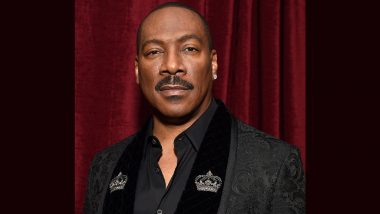Actor and comedian Eddie Murphy shared profound insights into his career and personal life, delving into topics ranging from the challenges of fame to racial dynamics in the entertainment industry. The 60-year-old addressed the legacies of icons like Elvis Presley, Michael Jackson, and Prince, and described them as cautionary tales, in an interview obtained by The Hollywood Reporter. "Those guys are all cautionary tales for me," he remarked, emphasizing his awareness of the pitfalls that fame and substance abuse can bring. Murphy, who has maintained a sober lifestyle with minimal drug use throughout his career, attributed this to a lack of curiosity rather than moral superiority. Beverly Hills Cop Axel F Trailer: Eddie Murphy Returns After 30 Years, Teams Up with Joseph Gordon-Levitt to Save His Daughter's Life! (Watch Video).
Reflecting on his early fame, particularly as a Black artist in an industry not designed for him, Murphy spoke candidly about navigating challenges. "This business, it's not set up for a Black artist," he explained adding, "You don't have people watching your back, and you don't have support groups." Despite these hurdles, he credited divine intervention for guiding him through the metaphorical minefield of fame for over three decades. The conversation also touched upon a personal feud with comedian David Spade, stemming from a joke made on Saturday Night Live about Murphy's career, as per The Hollywood Reporter. Murphy expressed hurt over the incident, highlighting the personal nature of the joke and questioning the show's producers for approving it. However, he has since reconciled with Spade and other individuals involved, including SNL creator Lorne Michaels. Candy Cane Lane: Eddie Murphy's Film To Release On Amazon Prime Video On December 1.
Murphy further addressed his influence on comedy and Black representation in Hollywood. He noted that he paved the way for comedians like Kevin Hart, Dave Chappelle, Chris Rock, and Chris Tucker to become leading figures in entertainment. "I changed it to where the comic can be the main attraction," Murphy stated, reflecting on his impact on the perception of comedians and Black actors in mainstream cinema.













 Quickly
Quickly


